- Home
- T. Kingfisher
Minor Mage Page 2
Minor Mage Read online
Page 2
But now he got to come back as the conquering hero. His mom would be glad to see him and wouldn’t yell at him for leaving. Harold was going to take the heat, not him.
Which he deserves. I’m pretty sure he tried to kick my familiar once when he thought I wasn’t looking.
Despite the heat, Oliver began to whistle.
I wonder what the Cloud Herders will look like.
The line of paw prints behind the armadillo began to weave back and forth across the road. Oliver reached down and scooped his familiar up in his arms.
“I can still walk,” said the armadillo.
Oliver didn’t say anything. Armadillos have their dignity. After a few moments, his familiar rested his armored cheek against Oliver’s own and sighed.
“Master?” asked a very young Oliver, cradling the faintly damp warmth of a very young armadillo in his hands. “Can I ask a question?”
“You can always ask,” said the old wizard. “You should always ask, in fact. Questions make the world go round! Whether I’ve got an answer is another matter.” He was having one of his good days, and his eyes were hard chips of sapphire in his wrinkled face.
The baby armadillo rolled over and snuffled at Oliver’s fingers. Oliver exhaled in sheer wonder. He had known the young armadillo for less than two hours and loved him fiercely. Sure, he was a very, very young armadillo, and somewhat unfinished looking, but he was already cuter and more entertaining than the baby next door.
The baby next door would have been radically improved with claws and a snout, as far as Oliver was concerned.
“Why do we have familiars?”
“Do you not want one, then?” asked the old mage. “Bit late, I’d say.”
“No!” Oliver clutched the armadillo to his chest, afraid that someone might snatch him away. The armadillo cheeped in protest, then dug with almost nonexistent claws at Oliver’s shirt, seeking the protection of someplace dark and warm. “I want him! I’m not saying I don’t! But why do we have familiars? What do they do?”
The old wizard grinned. The baby armadillo discovered the neck of Oliver’s shirt and began burrowing determinedly down inside. Oliver felt him clamber down and settle into the hammock where Oliver’s shirt was tucked into his pants.
He hoped that the armadillo wouldn’t pee on him again. There were four armadillo kits in the litter, three of which were nursing quietly on their mother, the old wizard’s familiar. The fourth had looked up when the door opened, let out a cheep, then wobbled determinedly across the floor to Oliver and peed on his foot.
“Well.” The old man leaned down and petted his own elderly familiar, who was laying on her side, looking like a small, scaly footrest. “Familiars are important. They remember things we forget. Some of them—not armadillos, usually, but other kinds—act as your hands. Someday you’ll be able move yourself into your familiar’s mind and watch through their eyes.” He stroked the mother armadillo’s ears, and she snorted with pleasure.
“Mostly, though, they remind us that we’re wizards…”
The armadillo did not have a name, or rather, he had only one name, and that was enough.
His true name was Eglamarck. Oliver knew better than to bandy that name about in public, or indeed, any time when it wasn’t strictly magically necessary. A familiar’s true name was the key to what made it a familiar, instead of just another armadillo nosing around in the dry lands and licking up insects. It was not to be used lightly.
Since he had a name for the important things, the armadillo did not see the point of having another one merely for the convenience of his wizard. He was not a dog. He wasn’t going to get saddled with a name like “Spot” or “Lucky” just so that he could be trotting back and forth at all hours when the name got called. If Oliver needed him, he’d be around.
Oliver’s predecessor, who had Eglamarck’s mother as a familiar for nearly seventy years, had told Oliver that it wasn’t worth fighting over. For the few years that he had taught Oliver, his armadillo had been “my armadillo” and Oliver’s had been “your young armadillo there.” They’d managed.
Oliver had resigned himself to having a familiar who was effectively named “Armadillo.”
His predecessor, that wonderful white-bearded old man, had told Oliver a lot of things. Unfortunately, he was nearly ninety by the time he’d taken on his last apprentice, and his mind wandered badly. He’d done his best, but some things he told Oliver four or five times, and many things he hadn’t told him at all.
But he’d given the young mage all the books he had, and a small, scaly bundle of infant armadillo, and from those things, Oliver had learned enough that the townspeople had taken him as the new mage.
It hadn’t been too bad, truth be told. People came to him when they had a magical problem—gremlins in the mill works or fairy lights in the pasture, potatoes that spoke in tongues when you baked them, or roosters that laid eggs that hatched into snakes and toads. Minor things.
Oliver would listen to the problem, or gingerly accept a handful of prophetic potatoes, nod gravely to the client, and go into his room in the attic. There he would pore through his books—usually the Encyclopedia of Common Magic—until he found what might possibly be causing it, and then, with trial and error and 101 Esoteric Home Remedies, he would go out and try to fix it.
Either because he was so young, or because the old mage had been old for such a long time and they had gotten used to a fairly low standard in wizardry, the villagers were fairly understanding of his mistakes. It helped that he didn’t charge until he was a hundred percent sure that the problem was gone, which usually meant waiting for at least a week and several follow-up visits. And he never charged very much anyway, which probably helped even more.
By the time he was eleven, Oliver was pretty good at identifying problems, if not always solving them. He could tell a possessed potato from one that had merely been planted in a patch of bad ground—magic lay under the dirt sometimes, like groundwater, and root vegetables were prone to draw it up—and he knew when to get out fire and salt and hemlock to drive out the wicked spirit at the heart of the spud, and when to simply advise the farmer to plant kale there in the future. He knew six charms to banish fairy lights (which one to use depended on the weather and it generally took at least two tries before he’d hit the correct one), and he could tell when a gremlin infestation was bad enough to merit a charm bundle made out of anise and quail bones, and when to just send in the cats.
Most of the charms and recipes required herbs, so he’d learned a certain amount of herb-lore, but it was tricky stuff, and he had to rely heavily on the armadillo’s sense of smell. His mother, who was very proud of her son the wizard, planted the more common plants in her herb garden, or grew them in pots on the windowsill. But some things only grew out in the woods, or along streams, and he’d have to go looking. When roosters got a touch of cockatrice fever, and started laying eggs full of snakes, for example—you needed wood sorrel for that, and trout lily. That involved a hike through the woods with the armadillo trotting at his heels.
Oliver was stocky and tended to be on the plump side, but scrambling around in the forest looking for obscure plants, his only guides a book of black-and-white drawings and a snide armadillo, had kept him reasonably fit.
Magic was hard and tricky and demanding, and it went wrong more often than not, but it was interesting, too, like solving a constantly changing jigsaw puzzle.
It was a pretty good job, all things considered. He hadn’t learned many real spells—three in all, and the one to protect against armadillo dander probably didn’t count—but he knew plenty of recipes for charms, and the villagers paid in eggs and cheese and butter and bacon, sometimes more than he and his mother and sister could eat. They had the best fed pigs in the village. The armadillo had eaten so much that he was reduced to a slow waddle and insisted on being carried everywhere, until Oliver put him on a strict diet of only one egg a week, and no more cream.
This worked until
his sister had gotten married and moved away and now the eggs were starting to pile up again. But it would have been unforgivably rude not to accept food when people were determined to give you something, so his mother had been pickling eggs by the gallon. Some days it seemed like half the plants he gathered went to season pickles.
It was the plants that had alerted him to the drought.
He was used to plants by now. He knew the difference between the shapes of leaves, whether they were pointed like a spear or had fingers like a hand, whether they were fuzzy or waxy or smooth.
He knew that none of those leaves should be turning brown and curling up at the edges.
He knew that the bluebells should be sending up leaves like cabbages at the end of March, not the beginning of February. It got warm too early and the plants came up too early and then it got hotter and hotter and they died early, too. The trees budded out a month before the spring festival and their roots began to drink the wells dry.
Oliver knew that the streams should be choked with livercress right now, and that the edge of the forest should be thick and green, instead of brown and dry.
Instead, the streams were mostly mud and the livercress had vanished months ago, which meant that he was using dried leaves instead of fresh, and it worried him.
It worried him more when he walked through the marsh and found it dry and crackling underfoot, the grasses as stiff yellow as broom bristles. It looked like late fall instead of summer.
It was bad. Trees that he had known when he was barely old enough to toddle were losing leaves like they were about to die.
That was why, when the mob had showed up, they’d found him with his bag already packed.
Somebody had to bring back the rains, and apparently it was going to have to be him.
Apple trees lined the edge of the road as they passed the orchard. The few apples that hung from the branches were small and tired looking. The drought hadn’t done them any good, either.
They weren’t ripe yet, but Oliver hadn’t had any breakfast. The likeliest one of the lot was far out of reach.
He stopped, leaning against the fence rail. The armadillo took advantage of the halt to wash his face like a scaly cat.
“Pushme, pullme…” whispered Oliver under his breath, and concentrated hard on the stem of the apple.
Doing a spell was a hard thing to explain. It was like thinking hard about something, but sort of sideways. You concentrated, and you said the word, and then you pushed with the inside of your head, really hard—
The stem snapped, and the apple slipped through the leaves, bounced off a branch, and landed at the edge of the road. Oliver pounced on it.
He’d learned the pushme pullme spell the previous spring, when Harold the miller had a gremlin infestation in the mill and hadn’t bothered to call him out until they started breaking the machinery. It was dangerous to have gremlins in the mill—if they got caught in the gears and ground up with the flour, the bread had a tendency to explode, or bleed, or turn into a flock of starlings and go screaming around the kitchen. But Harold had always been cheap, and he didn’t care if people complained.
When faced with a potential repair bill, though, he’d called Oliver out quick enough, but by then, quail bones and anise and rue wasn’t nearly enough. They’d left little packages of mischief meshed in all the gears and cogs, and Oliver had to go over the entire millworks, popping out each mischief and catching it in a clean linen handkerchief. He’d had a huge bag full of the stuff by the end, like a sack full of smoke and nettles. It had taken days, while Harold breathed down his neck and lost money, and Oliver had mastered the pushme pullme spell in desperation, to knock the mischief loose, or pull it close enough to grab.
It wasn’t nearly as useful as having an invisible hand—he’d read about such a spell but couldn’t get it to work—but it was about as good as having an invisible foot. You could close doors with it, or prop them open, pull things close or kick them away. If he was very patient, he could pick up fairly small things, with almost exactly the same painful mental effort as trying to pick something up with his toes.
It was also an excellent spell for picking apples he couldn’t reach. He took a bite. It was sour but refreshing.
“You’ll regret eating that later,” said the armadillo.
“I know,” said Oliver, taking another bite.
3
Oliver slept that night under a tree, which was horribly uncomfortable. He had a jacket for a blanket, and his backpack for a pillow. As pillows went, it did not compare well to his goosedown pillow at home. It was lumpy and buckled and the corner of 101 Esoteric Home Recipes dug unpleasantly into his cheek.
The shortcomings of the pillow, however, were nothing compared to using the ground as a mattress. Things poked him and prodded him, the ground was hard and rocky, and the only crop to survive the drought seemed to be the bumper crop of insects.
His discomfort was made worse by the queasy, cramping feeling from eating not one but three sour apples. They had been delicious at the time, but it wasn’t a good thing to eat on an empty stomach. He hadn’t even bothered making dinner. (The armadillo hadn’t said I told you so, which only made Oliver that much more aware that his familiar had indeed told him so.)
“Quit squirming,” grumbled the armadillo.
“There’s rocks on the ground,” muttered Oliver.
“It’s the ground. It’s made of rocks.”
Not for the first time, Oliver wondered if speech was really a good idea in a familiar.
After a minor eternity of something that wasn’t quite as satisfying as sleep, but was at least a little like it, the sun came up. Oliver got up with it. He drank from the drainage ditch beside the road. There was a thin film of dust on top of the water. Insects clung to the dry plant stems and sang back and forth across the armadillo’s head.
“Are we going to do that every night?” asked Oliver as he climbed out of the ditch. “Aren’t there farm houses along the way or something?”
The armadillo stood up on his hind legs and scratched his belly. “I don’t know. Nobody comes out this way, do they? This is all farmland… was all farmland… but I’ve never seen any of the farmers in town.”
Oliver wondered if the farms had been abandoned. The fences weren’t in great repair, it was true. He wondered if there’d be more weeds if there was more water to grow them. A few patches of soil, lying lower than the rest of the fields, were fuzzed with green, but no one had planted out crops. There was a hard crust on the ground. He didn’t think it had been plowed this year. Maybe not for several years.
“All I know is that if we go far enough, then we get to Harkhound Forest,” the armadillo said. He dropped back down and gazed at the distant mountains. “It’s the forest I’m worried about. It has a reputation.”
“What sort of reputation?” asked Oliver.
“A bad one. And my mother said that the slugs tasted wrong.”
“Oh, well…” Oliver knew the ultimate condemnation when he heard it. “How far is it?” He kicked himself mentally for not having asked earlier.
The armadillo considered. “Five or six days to the forest, I think.”
“Six days?” Oliver already felt like he’d been walking forever. Sleeping on the ground for one night had been bad enough. Sleeping on the ground for a half-dozen nights would probably leave his spine in a permanent kink.
“It’ll take longer if we stand around talking,” said the armadillo, plodding down the road on stumpy legs.
Oliver sighed. “Is there a shortcut?”
“Buy a horse.”
They didn’t have enough money for a horse. Oliver counted the coins in his purse and figured that they could afford maybe a hoof and a couple of hairs off the tail, if it wasn’t a very good horse. There was also a distinct lack of people to buy horses from.
He rummaged in his pack and pulled out a biscuit. It had been fresh and crumbly yesterday. Today it was rather chewy, and it made him thirsty. H
e had to scramble back into the ditch and take another drink of the dusty water.
The armadillo continued to plod. Oliver ran wet hands through his hair and over his face and went after him.
It was a long day, and nothing happened during it, except that Oliver’s feet hurt and his eyeballs ached from the dust and the glare. He shook out the cloth that had held the biscuits, soaked it down, and wrapped it around his forehead. That helped a little with the glare.
They walked and sometimes they stopped to rest. There was not much comfort to be had sitting in the dust on the side of the road, so they never rested for long. When the armadillo’s short legs began to tire—not that he would ever say anything, but Oliver could tell—Oliver would pick him up and carry him.
“You’ve got biscuit crumbs in your hair,” said the armadillo, and then there was the snuffly, ticklish sensation of a snout against his scalp. Oliver laughed involuntarily but let his familiar pick them out.
They saw no other humans. Occasionally there was a farmhouse standing empty. Once, far across a field, he saw something that might be a goat or a sheep, but it did not approach.
It occurred to Oliver that not only had he never gone any farther along this road than the orchard, he’d never really wondered what was out here. It hadn’t been forbidden, and thus interesting, the way that the ruins of the old watchtower had been. It had been known among the children of Loosestrife that there was nothing much in this direction, so no one had bothered. You could stand on the edge of the orchard and see fields and fences and there was no reason to believe that there was anything different beyond them.
Fat lot of good it would have done me if I had wondered, though. Even if I’d come this way on a whim, I’d have gotten bored long before I stopped for the night.
Evening was starting to come on, and he was starting to wonder when to stop for the night—should he stop early, make a fire, and have one of the little packets of tea in his pack? He hadn’t seen any place that looked more comfortable than last night’s tree.

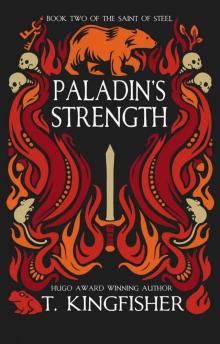 Paladin's Strength
Paladin's Strength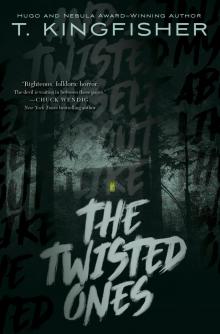 The Twisted Ones
The Twisted Ones The Hollow Places
The Hollow Places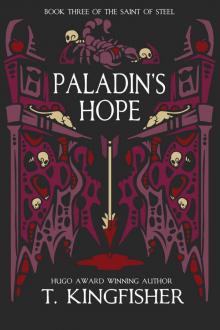 Paladin’s Hope: Book Three of the Saint of Steel
Paladin’s Hope: Book Three of the Saint of Steel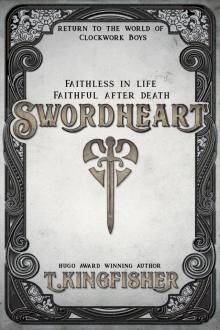 Swordheart
Swordheart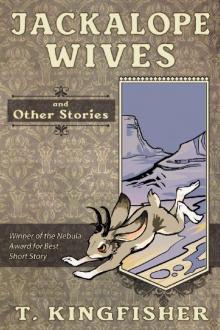 Jackalope Wives And Other Stories
Jackalope Wives And Other Stories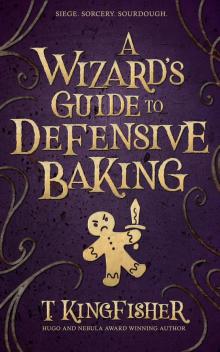 A Wizard's Guide to Defensive Baking
A Wizard's Guide to Defensive Baking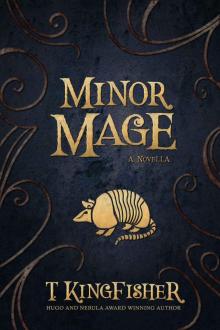 Minor Mage
Minor Mage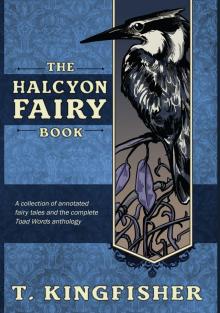 The Halcyon Fairy Book
The Halcyon Fairy Book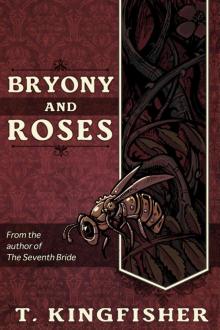 Bryony and Roses
Bryony and Roses The Wonder Engine_Book Two of the Clocktaur War
The Wonder Engine_Book Two of the Clocktaur War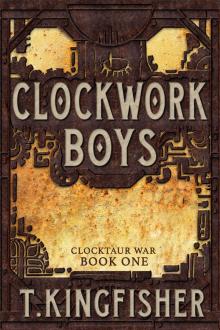 Clockwork Boys: Book One of the Clocktaur War
Clockwork Boys: Book One of the Clocktaur War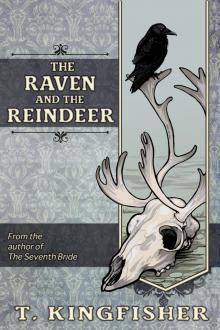 The Raven and the Reindeer
The Raven and the Reindeer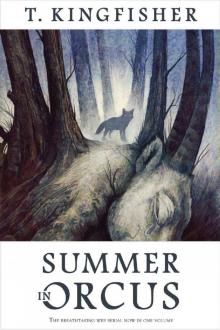 Summer in Orcus
Summer in Orcus The Wonder Engine
The Wonder Engine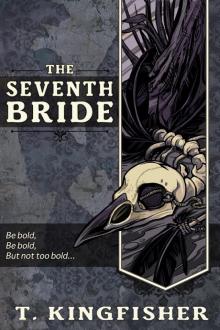 Seventh Bride
Seventh Bride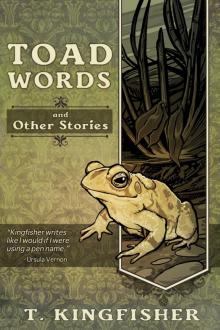 Toad Words
Toad Words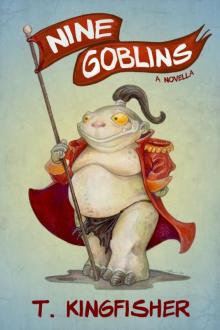 Nine Goblins
Nine Goblins